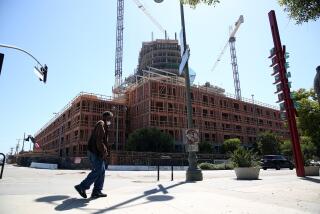2 Key Firms’ Results Raise Housing Fears
- Share via
Key housing industry players Countrywide Financial Corp. and Toll Bros. Inc. said Wednesday that mortgage demand and new-home sales were falling more than expected, raising fresh concerns that the nation’s real estate slowdown might be deepening.
Some experts and industry officials are beginning to question whether the widely expected “soft landing” -- in which home sales and prices level off -- might be replaced by a harder, more prolonged decline.
“It appears as though [the slowdown] will last for at least six months more, it may last for two years more. We don’t know,” said Robert Toll, chief executive of Toll Bros., a Horsham, Pa.-based luxury home builder that reported that its home orders in its most recent quarter were cut in half while revenue fell compared with a year earlier.
Toll had been among the industry’s bulls, saying as recently as last spring that real estate would rebound later this year.
Calabasas-based Countrywide, the largest U.S. mortgage lender, said Wednesday that its July loan volume fell 19%, more than expected. The company reported double-digit declines in adjustable-rate, home equity, sub-prime and pay-option lending. It reduced its staff by 382 employees last month.
“People are overly optimistic about this ‘soft landing’ as to real estate values,” Countrywide Chief Executive Angelo Mozilo said in a conference call last month. He predicted that home prices would be flat this year because of a buildup in the number of new and existing unsold homes, particularly in California, Florida and New York.
Countrywide’s declines were “unexpected, because the summer months are often the peak production periods,” wrote Mike McMahon, a Sandler O’Neill & Partners analyst, in a note to clients. Countrywide’s July results suggest “that the mortgage market is slowing more than previously thought and/or that Countrywide is pulling back.”
Also Wednesday, San Diego-based sub-prime lender Accredited Home Lenders Holding Co. lowered its profit outlook for the year because it expected lower loan volume and sales.
Wall Street responded by hammering the already battered stocks of these and other housing-related companies. Countrywide shares lost 8.7% while Toll’s plunged 6.4%. Accredited stock tanked 17.2%.
Coming one day after the Federal Reserve took a breather in its campaign to raise interest rates, reports of a deteriorating housing market also renewed fears of a broader economic slump.
By some measures, close to a third of the economy’s growth comes from housing, and any downshifting in the market is expected to cause a shock.
“How often do you see a soft landing? It’s not that common,” said Greg Gieber, an analyst with A.G. Edwards & Sons. “I think things will get a lot worse before getting better.”
Analysts and industry leaders have been counting on pent-up demand, job growth and consumers’ resilience to keep the housing market slowdown from becoming a free fall. Many analysts still say a soft landing is likely, barring massive job losses or other economic calamities that would force many homeowners to sell. Southern California’s market is holding up better than most, in part because of a lack of overbuilding and steady demand.
The housing slowdown has been orchestrated in part by the Fed, which started to raise short-term rates two years ago to cool off rapidly rising home prices and contain inflation. That led to conditions evident today -- higher mortgage rates and fewer transactions, said Gus Faucher, director of macroeconomics at Moody’s Economy.com.
Toll Bros., which caters to affluent buyers and has among the highest prices in the industry, said preliminary data for its fiscal third quarter ended July 31 showed that orders plunged 47% compared with a year earlier. Wall Street had expected a 33% to 40% drop in orders.
Toll Bros. noted that orders were soft in some previously hot markets such as Palm Springs. Toll built about 9,000 homes in its last fiscal year, 11% of them in California.
CEO Toll said Wednesday that the downturn seemed different from previous cycles, citing a rise in unsold homes and nervous consumers sitting on the sidelines.
“It is the first downturn in the 40 years since we entered the business that was not precipitated by high interest rates, a weak economy, job losses or other macroeconomic factors,” he said. Instead, Toll said, the slump has been triggered by speculation by investors who drove prices and sales to unsustainable levels in 2004 and 2005 -- and who now are sellers.
More to Read
Inside the business of entertainment
The Wide Shot brings you news, analysis and insights on everything from streaming wars to production — and what it all means for the future.
You may occasionally receive promotional content from the Los Angeles Times.










